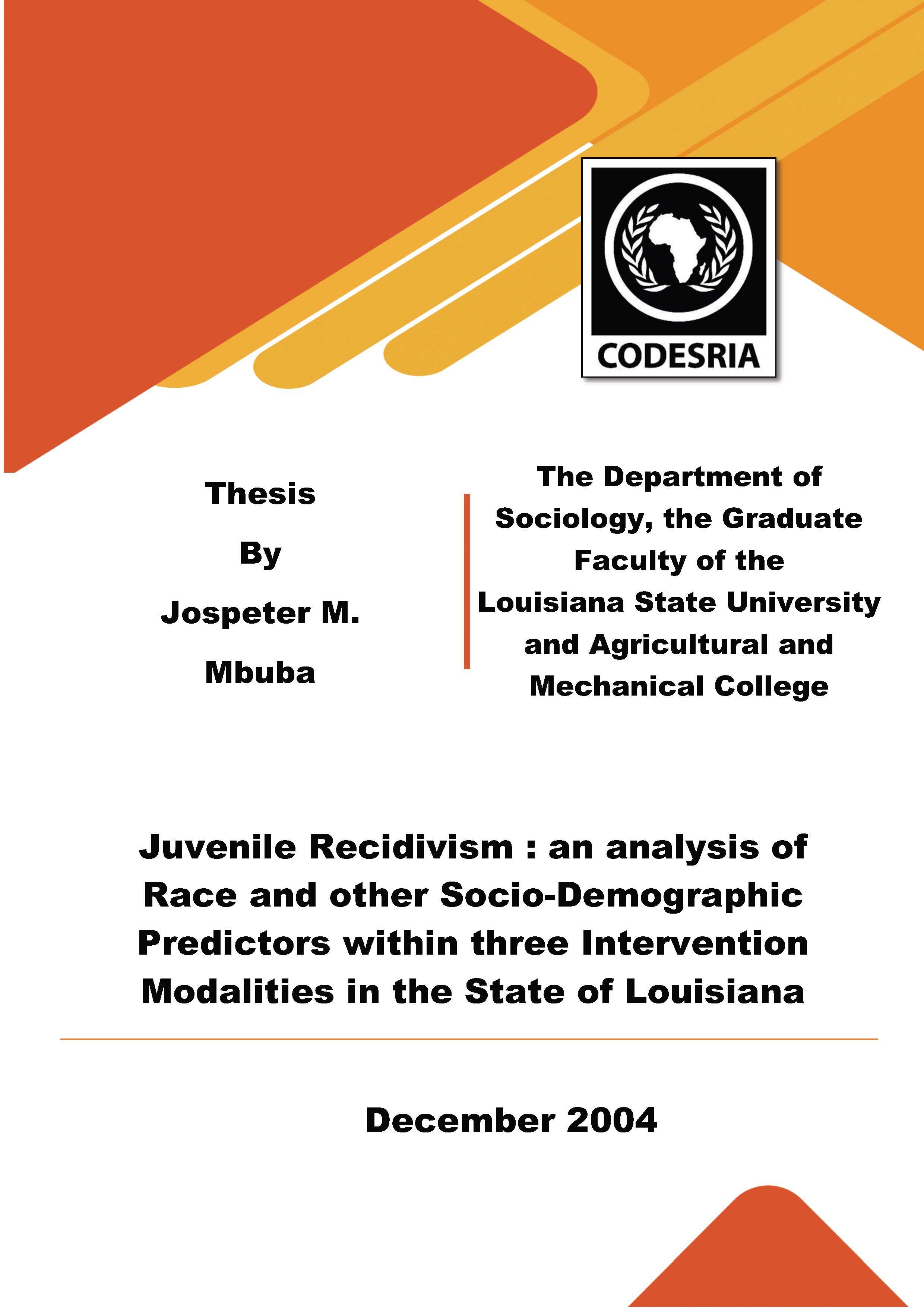Juvenile Recidivism: an analysis of Race and other Socio-Demographic Predictors within three Intervention Modalities in the State of Louisiana
Mots-clés :
Juvenile, Race, Socio-Demographic, Intervention, Modalities, State of LouisianaSynopsis
Owing to the increasingly growing problem of juvenile crime and the recognition that adult criminals begin their criminal careers in their juvenile years, the need to contain juvenile offending has never before been so glaring. Delinquency of young offenders can be predicted and prevented. But the methods most often used to predict juvenile recidivism typically derive from stereotypical conceptions, which often yield very low accuracy levels. This study is an attempt to make up for this shortfall. It tracks one year recidivism of 2,810 juvenile offenders released from state custody of Louisiana between July 1999 and June 2000. Of these releases, 919 were discharged from non-secure or community-based treatment modality, 572 from secure short-term modality, and 1,319 from secure regular type of incarceration.
The aim of the study was: to find out whether recidivism varies according to the three treatment modality types; to establish the correlation between recidivism and clients' individual socio-demographic characteristics; to find out whether race would
have any effect on recidivism, ceteris paribus; and to examine the relationship between race and other potential predictors of recidivism.
Existing literature was reviewed and among the frequently cited predictors of recidivism were: race, age at first adjudication, age at release, gender, duration of stay in custody, offense type, drug use, peer influence, alcohol use, family background,
emotional stability, health status, employment, educational achievement, school discipline, and economic status. The data were analyzed in three stages. The first involved a descriptive presentation, the second bivariate correlations, and the third logistic regression analyses.
It was found that the rate of juvenile recidivism does not vary according to the intervention modality type. The most significant predictors ofrecidivism were: (a) offense type/seriousness of the offense; (b) age at first adjudication; (c) duration of stay in the correctional system; ( d) drug use; and ( e) peer influence. The offender's race was not found to be important in determining the likelihood of recidivating. Black offenders differ from white offenders only in terms of gender, but not with respect to another socio-demographic characteristics that influence their reoffending behavior.
Téléchargements
Références
Akers, Ronald L. (1985). "Social Control Theory and Delinquency: A Longitudinal Test". Criminology, no. 23, pp. 47-61.
Agnew, Robert. 1992. "Foundations of a General Strain Theory of Crime And Delinquency". Criminology, vol. 30 no. pp. 47-87.
Andrews, D., I. Zinger, R. Hoge, James Banta, Paul Gendreau, & Francis T. Cullen (1990). "Does Correctional Treatment Work? A Clinically-relevant and Psychologically-informed Meta-analysis". Criminology vol. 28, no. 3, pp. 369- 404.
Archwamety, Teara & Antonis Katsiyannis, (1999). Academic Remediation, Parole Violations, and Recidivism Rates among Delinquent Youths. Remedial and Special Education vol. 21, no. 3, pp. 161-170.
Ashford, Jose B. & Craig Winston LeCroy (1990). "Juvenile Recidivism: A Comparison of Three Prediction Instruments". Adolescence vol. 25, pp.441-450
Babbie, Earl (2002). The Basics of Social Research. Wadsworth, CA: Belmont.
Baker, Amy J.L., Mary M. McMay, Cynthia J. Lynn, Hans Schlange, and Alicia Auville (2003). "Recidivism at a Shelter for Adolescent: First-Time Versus Repeat Runaways". Social Work Research, vol. 27, no. 2, pp.84-93.
Bartollas, Clemens (2003). Juvenile Delinquency. Allyn & Bacon, MA: Boston.
Benda, Brent B. (2001). "Factors that Discriminate Between Recidivists, Parole Violators, and Nomecidivists in a 3-Year Follow-Up of Boot Camp Graduates".
International Journal of Offender Therapy and Comparative Criminology vol. 45, no. 6, pp.711-729.
Bondeson, Ulla V. (2002). Alternatives to Imprisonment: Intentions and Reality. New Brunswick, Transaction Publishers.
Brezina, Timothy. 1996. "Adapting to Strain: An Examination of Delinquent Coping Responses". Criminology, vol. 34, no. pp. 39-60.
Bridges, George S. and Sara Steen (1998). "Racial Disparities in Official Assessments of Juvenile Offenders: Attributional Stereotypes as Mediating Mechanisms".
American Sociological Review vol. 63, pp. 554-570.
Bynum, Jack E. and William E. Thompson (2005). Juvenile Delinquency: A Sociological Approach. Allyn & Bacon, MA: Boston.






